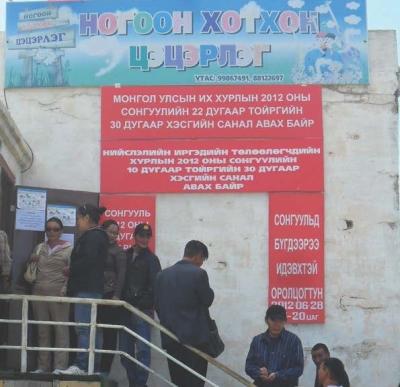likely leader of a governing coalition. The current prime minister and leader of the Mongolian People’s Party, Sukhbaataryn Batbold, won 28 seats, so he will be succeeded by the DP’s Norovyn Altankhuyag or another DP leader. The negotiations over a governing coalition will become clearer after the newly elected parliament appoints a new prime minister and cabinet. In the last few days, the DP has suddenly begun pushing hard for an expedited process that could see a new cabinet in July, even though initial expectations based on 2004 and 2008 had been for a coalition to be solidified by the end of the northern summer. It looks like Mongolia is now heading for a smooth political transition, unlike the aftermath of the 2008 parliamentary elections, when a ‘state of emergency’ was declared following the death of five people during large-scale protests.
The Mongolian government wanted to avoid similar unrest for the elections held this last June. To this end, the Central Election Commission implemented a number of reforms in line with Mongolia’s new election laws. But regardless of their success in making the voting process run more smoothly, the electoral reforms failed to build people’s trust in political institutions and parties.
Numerous measures were taken to make the campaigning and voting process on 28 June more trustworthy. This included the GEC enforcing campaign regulations more strictly than it had in previous elections. Parties were required to submit campaign platforms, which were audited by the GEC to ensure that they would not make promises that were not (economically) feasible. The parties were held to these platforms in their advertising.
To protect against allegations of multiple voting and unregistered voters, all polling stations were equipped with laptops connected to fingerprint scanners. Voters were given clear instructions on how to mark the ballot in the weeks leading up to the election, as well as in the corridor of the polling station; the instructions were also posted inside the booth itself. And, for the first time, ballots were counted by machine and a permanent video camera was set up to film the voting machines. Another innovation in this year’s elections was that domestic NGOs were able to nominate election observers to join party and foreign observers.
All of these factors together produced a highly efficient, well-organised and smooth electoral process.
But almost immediately after preliminary results started coming in, the DP and the Civil Will–Green Party Coalition (CWGP), who won 2 seats, made allegations of fraud and faulty programming of the voting machines, which prompted the recounting of votes by hand in many areas. Reassuringly enough, all but two machines were found to have correctly counted the ballots. In these two cases the difference in the total number of votes was negligible, which suggests that the machines had not been tampered with. But despite this confirmation, there continues to be a lack of trust in these new technologies, with most people feeling that corrupt election officials and party members could have easily manipulated them.
In many established democracies, voters are generally willing to trust that electoral processes are ‘free and fair’ and accurately reflect the ‘will of the people’. While trust in political institutions and the notion that all parties will play by the rules are commonplace in many countries, previous allegations of fraud have predisposed Mongolians to distrust election results. Though the election seemed to run smoothly with no obvious signs of fraud, technological upgrades and professionalism did not solve the real problem: a lack of trust in political parties.
If technology is not the fix, then adjusting the aims of political institutions and parties might be. Mongolian political parties need to dispel the image that they are ready to undermine the ‘will of the people’ in order to win. They need to show that they are willing to play by the ‘free and fair’ rules of the game.
Moreover, when parties lose, it should not mean that they need to buy more votes, offer more presents or commit more electoral fraud. Rather, it should indicate that they need better campaigns based on stronger policies. And when parties such as the DP receive fewer votes than expected, the response should not be pre-emptive allegation of fraud and corruption. Such allegations have generally been vague at best and unsupportable at worst. This type of response undermines any growing trust in the electoral process and may also explain the declining number of voter participation, from 76.5 per cent in 2008 to just over 65 per cent in this election.
Perhaps what Mongolia needs is less technology and more reform in what constitutes political ‘business as usual’.
Julian Dierkes is Associate Professor and the Keidanren Chair in Japanese Research at the Institute of Asian Research, University of British Columbia.
Brandon Miliate is an MA candidate in Asia Pacific Policy Studies at the University of British Columbia.
Julian Dierkes and Brandon Miliate are both authors on the Mongolia Today blog, available here.

